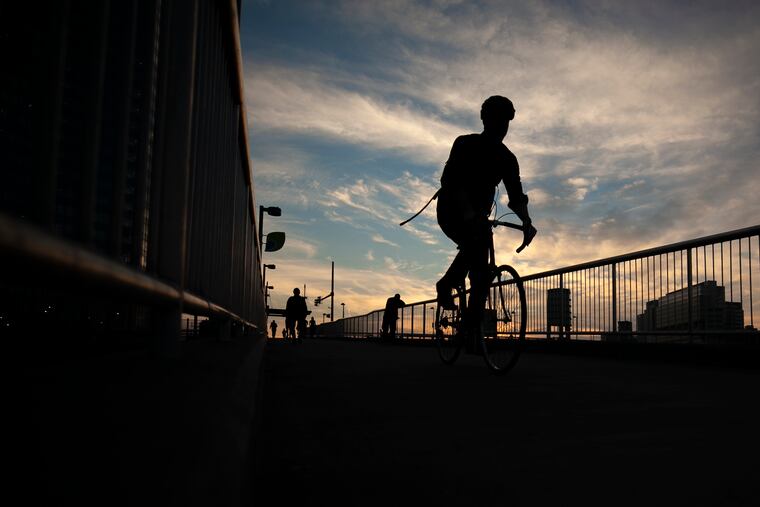Dockless bikesharing was poised for a try in Philly. Now there are no ‘concrete plans.’
The city welcomed applications through late summer but is moving away from those plans after receiving a single, incomplete submission.

Dockless bikesharing won’t be coming to Philadelphia — at least not right now.
The city poised itself for a pilot program by welcoming applications through late summer but received just one lone, incomplete submission, said city spokesperson Kelly Cofrancisco. So Philadelphia has decided, instead, to continue to focus on Indego, the city’s bikeshare program sponsored by Independence Blue Cross.
The reason for the course change appears twofold: An application missing key information, but also weakened desire in Philadelphia and across the nation, said Aaron Ritz, transportation programs manager at the city’s Office of Transportation, Infrastructure and Sustainability. A dockless program, like JUMP in Washington, D.C., allows riders to start and end rides where they want with the help of an app. Services like Indego require returning the bike to a docking station.
“I think the primary thing is lack of appetite," Ritz said. "If there was enough appetite, and there was enough success elsewhere, there would have been more people willing to ... provide applications.”
The city took applications until September, ultimately receiving a submission from Philadelphia-based Verve S that “wasn’t ready for prime time," Ritz said. The city closed the process and expects in coming weeks to announce the next steps for expansion of Indego, launched in 2015.
Kevin Thompson, CEO of Verve S, said he understands the city’s position but is determined to get a dockless program started after pushing for the effort for over a year, even if that means taking it to another city.
“In my eyes, we’re still going to try to actively pursue a dockless bike share program,” Thompson said. "Hopefully, in the city of Philadelphia.”
While there aren’t any “concrete plans” for dockless bikes in Philly, Ritz said, that doesn’t mean some version of the service wouldn’t be possible in the future. A hybrid dockless system is listed as a recommendation in Indego’s 2018 business plan.
“I’ll be clear that a lot of the promises of dockless bikeshare are very intriguing, and if the sort of operations side of things can get solved by the industry, we’re certainly open to that,” he said, “and we hope that in whatever future contract that we have, there’s a possibility for a much more flexible bikesharing program that has that convenience of dockless programs when run well and also can be run sustainably.”
A 2018 bill sponsored by Councilmember Mark Squilla pioneered a dockless option for Philadelphia, requiring regulations that eventually led to the pilot solicitation limited to two licenses. Philadelphia hoped to avoid the misuse of dockless bikes in other cities — such as instances of the the bikes being thrown into lakes and rivers — by instilling a lock requirement.
The two-part application also identified a pilot area as north of Lehigh Avenue and East of the Schuylkill, with a maximum fleet size of 1,200 vehicles.
But the trend may have shifted from dockless bikes to e-scooters — an option prohibited in Pennsylvania. Lime, a micro-mobility company once called LimeBike, moved in that direction in New York, Boston, and Calgary, while the 2018 Indego business plan noted “many of the initial players in the dockless bikeshare area have ceased operations entirely in the U.S.”
Just across the Delaware River, Philly watched as ofo, a Chinese dockless bikesharing company, abruptly left Camden in 2018.
“We’re willing to work through headaches and challenges, but it really has to have a strong, long-term case for the city and for the people that live here," Ritz said.
But of course, dockless bikesharing touts real benefits, including accessibility. Riders can cover more ground without thinking about finding a place to anchor.
Having more bikes is better, said Randy LoBasso of the Bicycle Coalition of Greater Philadelphia, who was disappointed to learn the city was moving on from dockless bikesharing at this time.
“I wish there could be some kind of option for people and communities outside of Center City to get some kind of bikesharing,” he said, “and it seemed like dockless was that option.”
» READ MORE: Dockless bike share is the next transportation trend Philly should embrace | Opinion
The city is focused on transportation equity as it sets ambitions of doubling Indego to more than 250 stations by 2024, as outlined in a request for proposals released in July. Adding more of its popular e-bikes is included in the plan, which has seen its own speed bumps when some went missing.
“We’re not going to be excited about a program that is just focused on Center City," Ritz said. “We want to be serving more of the city.”